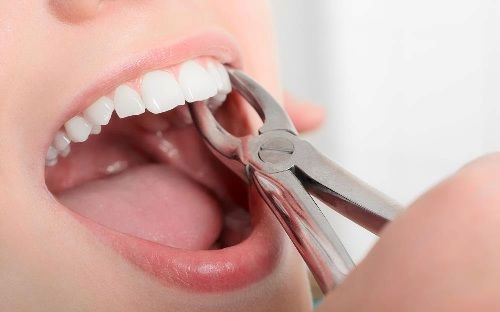Tooth Removal (Extraction) in Thornhill
The main goal of a dentist is to save a tooth which is broken or decayed by performing restorative treatments such as filling, crown or in a deep cavity by performing root canal treatment (RCT) and crown (cap). But sometimes the damage to the tooth or teeth is too extensive which make it almost impossible to be restored. In this situation, the tooth (teeth) removal may be the only option.
The followings are the common reasons for tooth extractions:
- Sometimes children’s primary teeth don’t fall out (off) in order to provide enough space for the permanent teeth to come out and take the place, so the primary tooth need to be extracted.
- Some patients originally and developmentally have extra tooth (teeth) which prevent the rest of the teeth to erupt, so the extra tooth is preferred to be extracted.
- For those who are undergoing orthodontic treatment, a number of teeth may need extraction to provide space for the other teeth to move and correct the alignment.
- People who need radiotherapy for their head and neck may require their teeth to be removed in the area being treated.
- Patients who receive chemotherapy or organ transplant usually have low or compromised immune system. They usually develop tooth infection that delays their treatment or can affect their healing process, so the diseased tooth, which is not restorable should be removed.
- Third molars or wisdom teeth are the common teeth to be removed. They come in when people are around 16-20 year old.
There are different indications for their extraction which include:
- Infection during eruption which is called pericoronitis
- Cavity or decays
- Gum disease, infection, cyst, or abscess around the tooth
- Faulty positioning with pressure affecting the neighbour tooth
In order to prevent further swelling, infection or damage to gum and other teeth, they are required to be extracted.
 Your dentist or oral surgeon will need to assess and update your medical and dental history and the list of your medications before planning for the extraction. They will prescribe a radiography of the individual tooth or a panoramic X-Ray to determine how the procedure will take place.
Your dentist or oral surgeon will need to assess and update your medical and dental history and the list of your medications before planning for the extraction. They will prescribe a radiography of the individual tooth or a panoramic X-Ray to determine how the procedure will take place.
In case the tooth which is planned for the extraction has infection, you might need to take a complete course of antibiotics prescribed by the dentist. Sometimes when wisdom teeth are impacted or all four wisdom teeth are planned for extraction at the same time, patient may need sedation or general anesthesia. The patient must be accompanied by somebody for emergency case or to drive them back.
It is also recommended that wisdom teeth to be extracted between the age of 16 to 24.
All post procedural instructions will be given to the patient at the time of release. The dentist may prescribe medicines for pain although the pain usually goes away within hours or a couple of days. Patients are advised to avoid smoking or drinking for 1-3 days.
When a sustained pain, bad odour is experienced 4-5 days after extraction a condition called DRY SOCKET may have happened (in 3%_4% of cases). This occurs when the blood clot hasn’t formed on the extracted site, which makes the bone be exposed to food particles, bacteria and air. This issue needs an immediate care and treatment by your dentist.
There maybe an ongoing swelling, pain, fever, difficulties in swallowing, numbness of tongue or lips for which you need to see your dentist right away.
At Dentistry for You our dentists and clinical staff are available to address your concerns and questions regarding oral and dental health.
To schedule your appointment for consultation with our team please contact us at 905-731-1871 Dentistry for You at Thornhill.